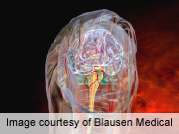Placebo is often effective in treating children with headaches, and innovative strategies are needed to reduce the placebo response rate and prove drug effects in trials, according to two studies published online Jan. 28 in JAMA Pediatrics.
(HealthDay)—Placebo is often effective in treating children with headaches, and innovative strategies are needed to reduce the placebo response rate and prove drug effects in trials, according to two studies published online Jan. 28 in JAMA Pediatrics.
In the first study, Khalil El-Chammas, M.D., from the Medical College of Wisconsin in Milwaukee, and colleagues performed a meta-analysis of 21 randomized trials assessing prophylactic headache treatment to reduce the frequency or severity of headaches in children and adolescents. The researchers found that placebos were effective, while drugs, including topiramate and trazodone, showed some efficacy for episodic migraines. Other commonly used drugs were no more effective than placebo.
In the second study, Haihao Sun, M.D., Ph.D., from the U.S. Food and Drug Administration in Silver Spring, Md., and colleagues performed a systematic review and analysis of pediatric trial data submitted to the FDA on triptans, already approved for adults but which had failed to show efficacy for treatment of abortive migraines in children. The researchers observed a high placebo response, with pain relief at two hours ranging from 53.0 to 57.5 percent, which could be reduced by non-randomization of patients with an early placebo response.
"Innovative trial designs intended to reduce the placebo response rate may be necessary to demonstrate a drug effect," Sun and colleagues write.
More information:
Abstract - El-Chammas
Full Text (subscription or payment may be required)
Abstract - Sun
Full Text (subscription or payment may be required)
Editorial (subscription or payment may be required)
Journal information: JAMA Pediatrics
Health News Copyright © 2013 HealthDay. All rights reserved.




















